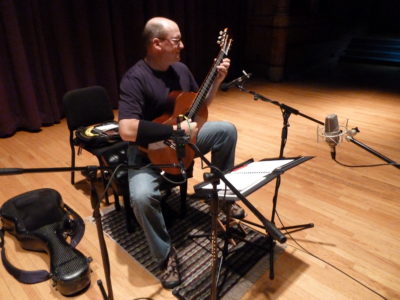Here is some further listening from today’s class.
My band from college was called “Milk of Amnesia”. We performed primarily in the MidWest (Chicago, Minneapolis, Madison, Milwaukee) where all three of the band members went to college together (UW-Madison). The song excerpt I shared in class today from “Kamikaze Airplane” can be heard again here: Kamikaze Airplane.
My piece for solo guitar and electronics, Roses Don’t Need Perfume, uses sounds of the guitar as an electronic backdrop for a live solo guitar part. All electronic sounds are “acoustic”, i.e. they are derived from guitar. You can hear the recording from the commercial CD, Draw the Strings Tight–which I engineered myself here in Barnes Hall–on my website. A score is there also, or linked here.
The piece is long (15 minutes), so I encourage you to listen to the first 3 minutes (Movement #1, first page of the score) only.
Here, too, since I mentioned this method in class previously, is an image from that recording showing the microphone placement…two near mics (12th fret, behind the sound hole) and a third large diaphragm condenser mic further away).
The second piece I played, called The Awful Grace, is based on a commemorative sculpture in Indianapolis, IN, where on the night of MLK’s assassination, Robert Kennedy announced the terrible news to a large crow, speaking from the back of a pickup truck.
With that speech, Kennedy calmed his audience from rioting, channeling his own experience losing his brother, JFK, who was assassinated 5 years earlier in 1963. Partway through, he quotes Aeschylus … lines that would late appear on his own gravestone after his own sad assassination just months later.
“Even in our sleep, pain which cannot forget falls drop by drop upon the heart, until, in our own despair, against our will, comes wisdom through the awful grace of God.” – Aeschylus
My central ideal with this piece was to channel that mutual empathy, which seemed to me important to our current moment.
My piece is for viola, percussion, and unmanned piano. The piano is used as a resonator (speakers placed inside and under) as well as being played *inside* by the percussions (fingers, sticks, mallets, his ringed finger, eBows).
In the excerpt you will hear, the first part is made up of these “inside the piano” sounds. Then you’ll hear Robert Kennedy’s voice, from his April 4th 1968 recitation of the Aeschylus, resonated into the piano. The voice is circulated back to the piano repeatedly (feedback) to enhance the frequencies of the voice (those “partials” we’ve been talking about) as they make the piano strings ring sympathetically. To hear this effect yourself, find a piano, put down the pedal, and shout into it! Finally, in the last section, the percussionist uses the eBows to play the strings directly, creating a singing melody. The drone sound in the background is derived from MLK’s voice, from his last speech (“I’ve Been to the Mountaintop”), given the day before his death. It’s specifically derived from the word, “see” in the line:
“…only when it is dark enough, can you see the stars”.
